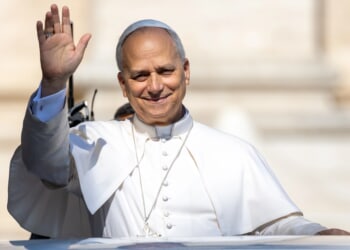Bartek Staniszewski is Head of Research at the think-tank Bright Blue.
Danny Kruger is by far the most impressive person to have defected from the Conservatives to Reform thus far.
Many of those who came before him seem to have had the political self-preservation instincts of a 1945 Japanese pilot and were largely liabilities to the Conservative Party; for several, it is a wonder why Nigel Farage took them in at all.
Not so with Kruger.
A serious thinker and, as Kemi Badenoch would put it, an “authentic conservative,” his departure will hurt the Tories.
Nevertheless, Kruger may yet grow to regret this arrangement.
His brand has long been married with that of a herald for the Christian right, a man who regularly espoused the central importance of Christianity to both the past and the future of British politics. In that, Kruger might soon find that he sits markedly at odds with a large swathe of Reform’s core voter base.
In recent weeks, Reform and the UK hard right have admittedly become, in the eyes of some, intertwined with Christian political rhetoric.
Bible verses featured among the paraphernalia borne by the protestors at Saturday’s ‘Unite the Kingdom’ march and a great wooden cross was carried near the front of the procession which fell on the Feast of the Holy Cross. This, however, is largely an import from the US, where religion has been a prominent part of the populist right’s image – from which the British hard right often takes inspiration – since at least 2016.
The truth is that the relationship between religion and Reform is much less clear-cut than the relationship between religion and the American right or, indeed, between religion and the Conservatives.
Perhaps the most uncontroversially unchristian piece of legislation recently introduced in the UK had been the Terminally Ill Adults (End of Life) Bill – the assisted dying bill. The Church of England and the Catholic Church both rallied against it; even Muslims came out strongly against it, despite not having a centralised religious authority in the UK in the same way the former two do.
Danny Kruger was one of the politicians fighting tooth and nail to oppose the Bill, then spending weeks scrutinising it on the bill committee.
Yet the legislation is popular with Reform’s core voter base.
The pollster More in Common divides the public into seven roughly equal segments, one of which used to be ‘loyal nationals:’ the people who “feel proud of their country … anxious about threats to Britain … carry a deep strain of frustration at having their views and values excluded by decision-makers in London … and feel more generally that others’ interests are often put ahead of theirs.”
Somewhat at odds with classic interpretations of Christian morality, they also “believe we live in a dog-eat-dog world, and that Britain is often naïve in its dealing with other countries.”
Loyal nationals, in other words, are Reform’s core voter base – the people who Farage always preached to and who are his most loyal soldiers. They are also exceptionally in-favour of assisted dying. Fifty-eight per cent of them strongly support it. This is as compared to only 31 per cent for ‘established liberals’ – another More in Common segmentation that represents the platonic Blue Wall voter.
Indeed, Reform’s core voters are not particularly religious.
In the most recent British Election Study, religious people were only 22 per cent more likely to vote for Reform as compared to atheists. On the other hand, they were a vast 68 per cent more likely to vote for the Conservatives. The Church of England is often described as ‘the Conservative Party at prayer’ not without reason; Christians have reliably turned out for the Tories for generations. In his defection speech, Kruger made it clear that he saw Reform as the party that had become the chief party of conservatism, but Reform’s most loyal voters’ understanding of conservatism is vastly different from his own.
If Kruger was disappointed that the Conservatives failed to understand the importance of Christianity to conservative philosophy, the problem among Reform voters is only worse.
Maybe Kruger will be able to change this.
For the first time, with Kruger’s defection, Reform have among their ranks a truly serious thinker. An enduring criticism of Reform has been that they do not have any serious policies – except, perhaps, on immigration – and that, whenever they try to come up with some, they are soon forced to retreat. That, where it comes to real policymaking, they are toothless.
Kruger can perhaps be their dentures.
But the policies and philosophy he comes up with – if he is allowed to do so – may not be what Reform’s voters have been looking for.
Some of the institutions most cherished by the religious right – the Church of England and the monarchy – are often scorned by Reform’s most zealous supporters who see the former as woke and the latter as something only worth supporting if the monarch happens to agree with them – as opposed to the sacral legacy of thousands of years of English history.
Religion, to them, is often not a systematic belief system, but rather a cherry-picking exercise; a selection of verses by which to promote ultimately irreligious aims, and not the very foundation of what they believe in.
If Kruger’s hope was to champion a political philosophy anchored in Christianity, Reform is not the party to deliver it.





![Gavin Newsom Threatens to 'Punch These Sons of B*thces in the Mouth' [WATCH]](https://www.right2024.com/wp-content/uploads/2025/08/Gavin-Newsom-Threatens-to-Punch-These-Sons-of-Bthces-in-350x250.jpg)
![ICE Arrests Illegal Alien Influencer During Her Livestream in Los Angeles: ‘You Bet We Did’ [WATCH]](https://www.right2024.com/wp-content/uploads/2025/08/ICE-Arrests-Illegal-Alien-Influencer-During-Her-Livestream-in-Los-350x250.jpg)








